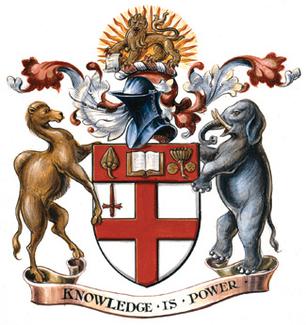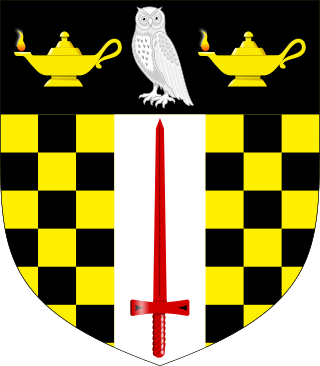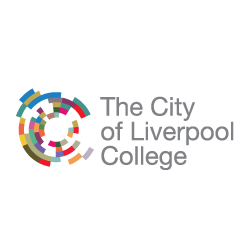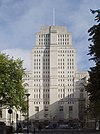Related Research Articles

Bloomsbury is a district in the West End of London, part of the London Borough of Camden in England. It is considered a fashionable residential area, and is the location of numerous cultural, intellectual, and educational institutions. Bloomsbury is home of the British Museum, the largest museum in the United Kingdom, and several educational institutions, including University College London and a number of other colleges and institutes of the University of London as well as its central headquarters, the New College of the Humanities, the University of Law, the Royal Academy of Dramatic Art, the British Medical Association and many others. Bloomsbury is an intellectual and literary hub for London, as home of world-known Bloomsbury Publishing, publishers of the Harry Potter series, and namesake of the Bloomsbury Group, a group of British intellectuals which included author Virginia Woolf, biographer Lytton Strachey, and economist John Maynard Keynes.

SOAS University of London is a public research university in London, England, and a member institution of the federal University of London. Founded in 1916, SOAS is located in the Bloomsbury area of central London.

The University of Western Ontario is a public research university in London, Ontario, Canada. The main campus is located on 455 hectares of land, surrounded by residential neighbourhoods and the Thames River bisecting the campus's eastern portion. The university operates twelve academic faculties and schools.

Tessa Ann Vosper Blackstone, Baroness Blackstone, is an English politician and university administrator.

The University of Derby, formerly known as Derby College, is a public university in the city of Derby, England. It traces its history back to the establishment of the Derby Diocesan Institution for the Training of Schoolmistresses in 1851. It gained university status in 1992.

Birkbeck, University of London, is a research university located in the Bloomsbury neighborhood of London, England, and a member institution of the University of London. Established in 1823 as the London Mechanics' Institute by its founder Sir George Birkbeck and its supporters- Jeremy Bentham, J. C. Hobhouse and Henry Brougham- Birkbeck is one of the few universities to specialise in evening higher education in the United Kingdom.

Edinburgh University Students' Association (EUSA) is the students' union at the University of Edinburgh, Scotland. The Association's aim is the advancement of education of Edinburgh students by representing and supporting them, and by promoting their interests, health and welfare within the community. It is led by a team of five elected student sabbatical officers.

The Defence Academy of the United Kingdom provides higher education for personnel in the British Armed Forces, Civil Service, other government departments and service personnel from other nations. The Director General of the Defence Academy is Lieutenant General Thomas Copinger-Symes, a senior Army officer.
King's College is a co-educational day and boarding British curriculum school in Madrid, which provides British education for children from Pre-Nursery to Year 13. It was founded in 1969 and is part of King's Group.

The City of Liverpool College is a further education and higher education college in Liverpool, England.
The London School of Jewish Studies is a London-based organisation providing adult educational courses and teacher training to the wider Jewish community.
Lancaster University Management School (LUMS) is the business school of Lancaster University in Lancaster, England. The school's history can be traced back to the establishment of departments of marketing and of operational research at the university's foundation in 1964. These and other related departments were organised into the "School of Business and Organizational Studies" in 1969. A full range of subjects are taught, ranging from undergraduate degrees to postgraduate degrees, including executive and full-time MBAs, PhDs and post-experience executive education.
Susan Fiona Dorinthea Michie is a British academic, clinical psychologist, and professor of health psychology, director of The Centre for Behaviour Change and head of The Health Psychology Research Group, all at University College London. She is also an advisor to the British Government via the SAGE advisory group on matters concerning behavioural compliance with government regulations during the COVID-19 pandemic. In 2022, she was appointed Chair of the World Health Organisation’s (WHO) Technical Advisory Group on Behavioural Insights and Sciences for Health.
University College London Hospitals NHS Foundation Trust (UCLH) is an NHS foundation trust based in London, United Kingdom. It comprises University College Hospital, University College Hospital at Westmoreland Street, the UCH Macmillan Cancer Centre, the Royal National ENT and Eastman Dental Hospitals, the Hospital for Tropical Diseases, the National Hospital for Neurology and Neurosurgery, the Royal London Hospital for Integrated Medicine and the Royal National Throat, Nose and Ear Hospital.
Catch22 is a social business, a not for profit business with a social mission which operates in the United Kingdom. Catch22 can trace its roots back 229 years, to the formation of The Philanthropic Society in 1788. Catch22 designs and delivers services that build resilience and aspiration in people and communities.

Scotland's Rural College is a public land based research institution focused on agriculture and life sciences. Its history stretches back to 1899 with the establishment of the West of Scotland Agricultural College and its current organisation came into being through a merger of smaller institutions.
Robert John Allison DL is a British academic. Professor Allison has held senior leadership roles in a number of top UK universities. Currently a Non-Executive Director and Trustee of several organisations, Allison was previously the Vice-Chancellor and President of Loughborough University.
New City College (NCC) is a large college of further education with campuses in East London and Essex. The college was formed in 2016 with the amalgamation of separate colleges, beginning with the merger between Tower Hamlets College and Hackney Community College, followed by the gradual additions of Redbridge College, Epping Forest College, and both Havering College of Further and Higher Education and Havering Sixth Form College. It is the second largest provider of post-16 education in the country since 2019.
The Workers' Library and Museum was a non-profit labour service organisation (LSO) active in Johannesburg, South Africa between 1987 and the early 2000s. The organisation provided a meeting and learning centre for labour activists as well as students from the nearby Alexandra and Soweto areas. In 1994, it was expanded into the Workers and Museum in Newtown, Johannesburg, with the only museum in South Africa focussed on working people other than the Slave Lodge, Cape Town.
Dora Kwartiorkor Opoku OBE was a midwife and educationist who was an authority in the field of medical research ethics.
References
- ↑ "The Careers Group". University of London. Retrieved 24 August 2020.
- ↑ All history up to 1984 is referenced to Weston, T. (1984). And Now at Gordon Square: The History of the University of London Careers Advisory Service 1909-1984. ULCAS.
- ↑ up to 1993 to Archives of the University of London Careers Advisory Service 1940-1993. Reference code GB 0096 UoL/CB housed at Senate House Library, University of London. For details on access please go to www.ull.ac.uk/historic/archives/uarchive.shtml.
- ↑ The University of London and Industrial Progress 1880-1914, Journal of Contemporary History, Vol 7 no 3/4 p259 (Sanderson, M)
Butler, T & Dane, M (2007) Reflections on Change 1967-2007. AGCAS.
